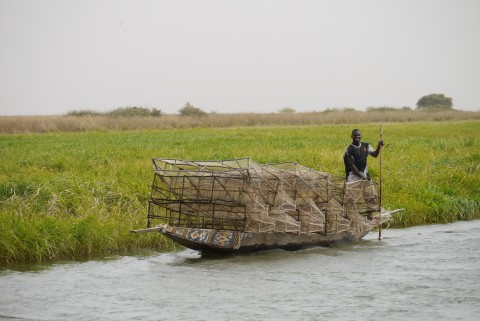
Global Flagship on Adaptation report: Work with nature, humanity first line of defence
-
Climate and disaster risks
-
Coastal resilience
-
Community resilience
The Flagship report by The Global Commission on Adaptation, launched today, makes a compelling case for working with nature to build resilience and reduce risk, loss and damage at all scales. Natural ecosystems are humanity’s first line of defence against floods, droughts, heat waves, and hurricanes, and deliver the myriad co-benefits vital to adapting to our unfolding climate emergency.
Wetlands International actively contributed to the report with input, in particular on nature-based solutions. We welcome the GCA call for large-scale protection and restoration of nature, including 90% of the watersheds for large cities, and for governments to adopt these approaches widely and reorient policies, subsidies and investments.
It shows that there is a clear case for nature-based solutions, but investment is not yet there, so now is the time to act. Investing $1.8 trillion globally from 2020 to 2030 in among others mangrove protection, climate resilient infrastructure (prioritising green infrastructure where possible) and making water resources more resilient, could generate $7.1 trillion in total net benefits, according to the report.
We fully agree with the alarm the report sounds. The window to work with ecosystems as our natural buffers is closing as many, such as wetlands, are in serious trouble. This is increasing people’s disaster risk, in particular, the poorest communities who depend directly on healthy ecosystems for their livelihoods.
In line with Wetlands International’s work with the Partners for Resilience alliance[i], the flagship report highlights that investing in adaptation measures such as creating natural shoreline barriers or restoring wetlands to tame dangerous storm surges and floodwater is a far more cost-effective strategy than responding after a disaster strikes.

Furthermore, greater consideration needs to be given to the fact that ecosystems themselves are vulnerable to climate change, and should be given space to adapt, for example, through landward migration of mangroves.
Ill-informed infrastructure currently brings serious harm to wetlands and to increased disaster risks. As such, we fully support the recommendation to prioritise green infrastructure where possible and that existing and new infrastructure assets have to be enhanced and designed to withstand projected climate impacts and ensure environmental sustainability.
The report, for instance, highlights that many cities have been relentlessly stripping away or building over floodplains, forests, and wetlands that could have absorbed stormwater or offered respite and precious water during heat waves and droughts.
As a member of the public-private innovation platform EcoShape Consortium which developed the innovative hydraulic engineering design approach Building with Nature, we underline the report’s statement that nature-based solutions like natural shorelines and wetlands can work well in tandem with constructed infrastructure such as seawalls. This approach makes solutions more sustainable and adaptive, typically cheaper to construct and maintain while enabling more productive and multi-functional land-use.
For accelerating Nature based Solutions, the report identifies the need for evidence of what works and what does not, sharing experiences and know-how across sectors and professional disciplines. In Building with Nature projects contractors, engineering companies, research institutions, governments and NGOs collaborate and jointly develop and spread knowledge and tools – exemplifying this collaborative and inclusive principle.
The report also spotlights the need for participatory planning processes, such as those pioneered by Wetlands International and its partners in the Building with Nature project in Indonesia [ii] (case study 4: Participatory Planning in Indonesia).
These are essential in developing shared goals, coordinating action, and building on traditional or local knowledge and respecting land rights. This programme has already scaled up at the landscape scale and is replicated by the government to 14 other districts. Indonesia is aiming to scale up the Building with Nature approach in different settings and is looking to help mainstream it in the Asia region — for which Wetlands International recently organised a workshop ‘Accelerating adaptation through Building with Nature in Asia’, hosted by the Global Commission on Adaptation.
Jane Madgwick, CEO of Wetlands International said: “We welcome the firm connection between ecosystems and climate that this report recognises. All efforts should go into the proper management of wetlands and other natural resources. We are committed to working in partnership so that wetlands can help accelerate adaptation in the key systems identified in the report. We are doing this for example through scaling up Building with Nature in Asia and through our work in the Sahel restoring wetland and dryland ecosystems and economies, thereby improving community resilience.”
For more information:
Susanna Tol – [email protected], +31 (0) 318 660 910
[i] Partners for Resilience (PfR) is an alliance of the Netherlands Red Cross (lead agency), CARE Netherlands, Cordaid, the Red Cross/Red Crescent Climate Centre, and Wetlands International, supported by the Dutch Ministry of Foreign Affairs.
[ii] Building with Nature in Indonesia is a programme from Ecoshape, Wetlands International, the Ministry of Marine Affairs and Fisheries (MMAF) and the Ministry of Public Works and Housing (PU), supported by The Dutch Sustainable Water Fund, The German Federal Ministry for the Environment, Nature Conservation and Nuclear Safety (BMU) as part of the International Climate Initiative (IKI).
